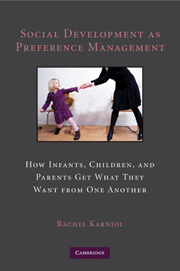 Social Development as Preference Management
Social Development as Preference Management Book contents
- Frontmatter
- Contents
- Acknowledgments
- Introduction
- 1 The Baby “Preference Game”
- 2 Children's Expression of Preferences
- 3 Emerging Meta-Preferences
- 4 Other People's Preferences
- 5 Parenting and Preference Management
- 6 Channeling Children's Preferences
- 7 Temporizing Preferences
- 8 Restricting Children's Preferences
- 9 Disciplining Noncompliance
- 10 Planes of Transformational Thought: Temporal, Imaginal, and Mental
- 11 Manipulating Others
- 12 Coping and Self-Regulating
- 13 Mind Play: Applying Transformational Thought
- 14 Minding One's Own Versus Others' Preferences: Altruism, Aggression, and Morality
- 15 Tying Up
- References
- Subject Index
- Name Index
11 - Manipulating Others
Published online by Cambridge University Press: 05 June 2012
- Frontmatter
- Contents
- Acknowledgments
- Introduction
- 1 The Baby “Preference Game”
- 2 Children's Expression of Preferences
- 3 Emerging Meta-Preferences
- 4 Other People's Preferences
- 5 Parenting and Preference Management
- 6 Channeling Children's Preferences
- 7 Temporizing Preferences
- 8 Restricting Children's Preferences
- 9 Disciplining Noncompliance
- 10 Planes of Transformational Thought: Temporal, Imaginal, and Mental
- 11 Manipulating Others
- 12 Coping and Self-Regulating
- 13 Mind Play: Applying Transformational Thought
- 14 Minding One's Own Versus Others' Preferences: Altruism, Aggression, and Morality
- 15 Tying Up
- References
- Subject Index
- Name Index
Summary
A 3-year-old shouts at a preschool peer, ‘Just shut up, Erik! Don't talk to me. Just be quiet. Don't crawl all over me neither. Don't do anything to me.’
(Paley, 1986, p. 114)In several earlier chapters, I discussed infants' and children's expression of their preferences. Telling others one's preferences is an effective strategy when others are willing accomplices who want to satisfy these preferences. But this is not always the case. Others may have conflicting preferences or may simply be unwilling to accommodate children's preferences. Concomitantly, others may express their external preferences as to what children should, or should not, be doing and these may conflict with children's own preferences. In this chapter, I discuss two types of interpersonal preferential conflict: (1) ones in which others represent obstacles that need to be overcome and what children do in their attempts to overcome them, and (2) ones in which children pose obstacles to others’ attainment of their preferences and children's strategies of resisting others’ imposition of their external preferences on them.
COPING WITH INTRANSIGENT OTHERS
Other people who are unwilling to resolve interpersonal preferential conflict with us represent either obstacles that need to be overcome or insurmountable barriers that need to be coped with psychologically. This distinction parallels that drawn between problem-focused and emotion-focused coping (Folkman & Lazarus, 1985), with the former geared toward changing external conditions so as to alter the situation, and the latter geared toward altering one's own experience of the situation rather than modifying the relevant external circumstances.
- Type
- Chapter
- Information
- Social Development as Preference ManagementHow Infants, Children, and Parents Get What They Want from One Another, pp. 219 - 243Publisher: Cambridge University PressPrint publication year: 2010


